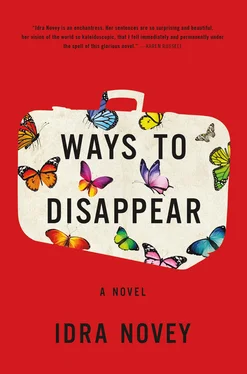
Emma woke up thinking about her author’s body. At first, it was just that Beatriz had one, a body as female and vulnerable as her own. Yet in the shower, Emma could not help imagining the details until she had fathomed them all, her author fully undressed at thirty-four, the age she herself was now. She imagined Beatriz looking down as she scrubbed her arms, considering her breasts and the ribs visible beneath her skin, remembering who had touched her and where, the men all over Rio who had turned to observe her and her green eyes and had no idea what she would go on to write. Who wouldn’t have cared if they had known.
In the nearly ten years that Emma had spent translating Beatriz, it had never occurred to her to consider whether her author’s body possessed as many complicated secrets as her fiction did. But why wouldn’t it? Wouldn’t it have to?
On her first read through the pages from Raquel, Emma kept skipping ahead. The shadow figure lurking in the alley behind the cinema felt so uncharacteristically contrived, a device out of a Sue Grafton murder mystery— S Is for Shadow . She kept waiting for Beatriz to subvert the cliché.
Yet every retelling led to the same stock image of a shadow and stopped. In the other scene, in Salvador, Beatriz kept losing traction, too. As Emma read on, she began to squirm. Any of the father’s averted-disaster tales could’ve veered into the stranger, more fantastical territory that Beatriz was known for, but none of them did. She’d never read anything from Beatriz so relentlessly flat and void of magic.
Unless, perhaps, the relentlessness was the point. Still, by the tenth iteration, Emma felt so exasperated with the alley scene that she had to put the pages down. When Raquel had been hesitant to hand her the manuscript, Emma had assumed it had to do with how little Raquel trusted or even tolerated her. But surely Raquel’s hesitation had come as much, if not more, from a mistrust of the pages themselves and what they possibly revealed.
If the scenes were from Beatriz’s own life, Emma wondered what had happened first. If it was the writing about those minutes in the alley that had sent her author impulsively clicking her way into hundreds of thousands of dollars in poker debt. Or if the poker problem had happened first, and, unable to focus on her writing, Beatriz had gone back to her early journals to revisit what they contained.
Or maybe it had been more complicated. Maybe what had unmoored Beatriz was not just revisiting that alley in her mind but her incapacity to move beyond the facts of the scene for the sake of story, to take the sort of imaginative, magical leaps that people — Emma included — had come to expect. She stiffened at the thought of all the adoring emails she’d sent Beatriz over the past year, how much she’d gushed about her eagerness to get lost in the wonderful strangeness of Beatriz’s new book when it was finished.
In her classes at Pitt, Emma had often spoken of her friendship with her author, how well they’d come to know each other. On her trips to Rio, she’d told Beatriz more about her boredom with Miles than she had any of her friends in Pittsburgh. Although perhaps those confidences had as much to do with being a visitor in Portuguese as it did with Beatriz. It had been so much easier to say that there was something deadening about running alongside Miles when she was speaking in another language and with a lilt and leaving in seven days. In response to this confidence, Beatriz had brought up a poem by Hilda Hilst, a wonderful line about a woman unwilling to keep to the room where her lover wanted her to remain. The line had tendered as much understanding, or more, as any reciprocal confession.
Or no, maybe it hadn’t happened that way. Recalling the conversation now, Emma wasn’t sure if it had been Beatriz who’d brought up the Hilst poem, or if she herself had, and Beatriz had just gone on sitting there, listening.
Emma pushed aside her author’s unfinished manuscript and pressed open her notebook against the bed. A jolt of words came to her, as if she’d just touched an electric fence, the sentences coming too fast to second-guess them. On the stand, the hazy specter of every translator ever put on trial rose and requested a mirror. For wasn’t it time for the eternal translator to be provided with an aid in the defense of her alleged crimes? At this late point in human history, didn’t anyone being tried for literary offenses have a right, even an obligation, to show the spectators in the gallery their own reflections as they watched her and what power their expressions had over her own?
THUMP THUMP!
THUMP THUMP THUMP!
Emma jumped up from where she’d been hunched over her notebook. She’d been so focused that she’d forgotten where she was. The person at the door banged again, rattling the frame of the watercolor beach scene hanging above the bed. They had come for her. She was going to die here. Raquel had been right.
Emma had made it a habit to fasten the chain lock on the door every time she returned to her hotel room, but maybe it wouldn’t matter. She’d seen hit men in movies tear the chain lock off its track as if it were no more than a string of cheap pearls around a woman’s neck. If she didn’t answer her phone or her email, she wondered if it would occur to Raquel or Marcus to call the U.S. Embassy. If they would know how to reach her parents. She thought of her mother, asleep on the plaid sofa, getting such a call but it was too awful. Impossible.
Hey, it’s Marcus, the thumper said. Open up.
Emma didn’t reply. It sounded like Marcus, but that didn’t mean it couldn’t be someone else, a hit man with a talent for imitation. She reached for her laptop and clicked on the last message from Miles. He checked his email incessantly in the evenings.
THUMP! THUMP!
Emma, você está ai?
How do I know you’re really Marcus? she called through the door as she typed.
Because I brought your wet sneakers into your room so you’d have sex with me.
And how long did I let you stay?
Not long enough, the voice on the other side answered. You were writing.
She unlatched the lock. The harsh fluorescent lighting of hotel hallways usually robbed a face of its beauty, but not Marcus’s. Not his high cheekbones and full mouth or his radioactive-green eyes. Emma pulled the door shut and he ran his hands over the goose bumps on her arms, over her breasts and down her ribs.
She didn’t ask if he’d called Raquel or if he knew that he might be kidnapped and lose an ear at any moment. What would it help if he knew now? He’d just arrived and they’d locked the door. She’d spent her life desperate to measure exactly how much she knew, and what had it gotten her?
A PhD.
An adjunct teaching job that came with a rusted metal desk she had to share with two other adjuncts, one of whom lived on Doritos and left neon-orange fingerprints on her Post-its.
A boyfriend who spent his evenings charting how his pulse rose during his morning run.
Outside the window of Emma’s hotel room, the Bahian moon was blue tinged and full over the ocean. Somebody on the street kept shouting, Maria, por favor! Come back here. Farther off, a car backfired, or it was a bullet shooting starlike through the dark. In her room, the thermostat glowed the temperature in Celsius. A balmy 31 degrees.
To: eneufeld@pitt.edu
Subject: Re: if you don’t hear from me tomorrow
Emma, your email was incoherent. Whose ear are you talking about? You need to get up RIGHT NOW and take a cab to the American embassy. The address is at brazil.usembassy.gov. I can’t get to Salvador until 9:23 tomorrow night.
Читать дальше













